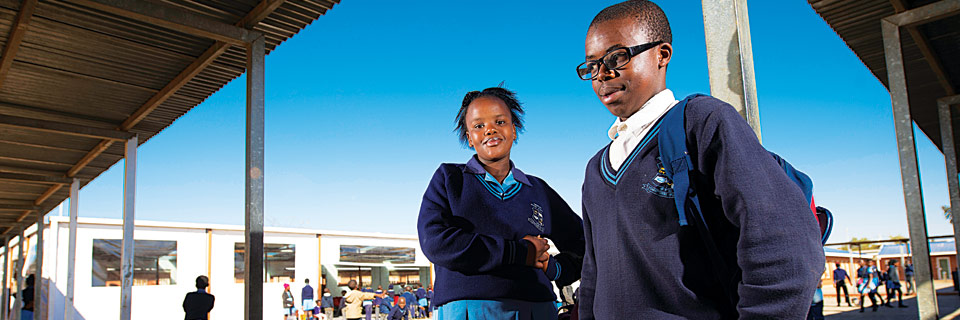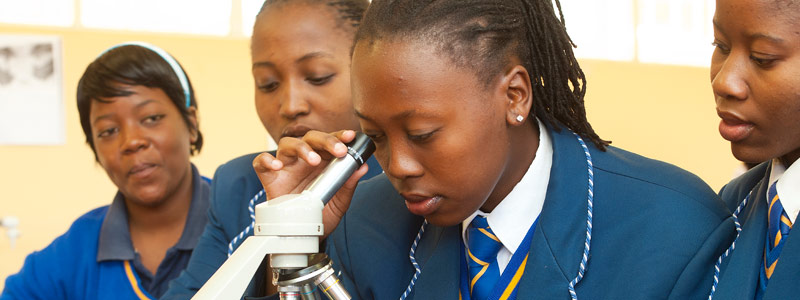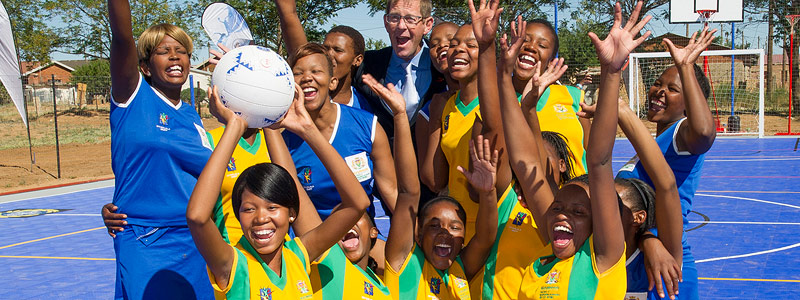Communities
As a socially-responsible company, we are committed to the sustainable socio-economic development and well-being of the communities where we operate.
We recognise that these communities are also the areas from which we draw our employees and healthy, flourishing communities can provide us with the quality of employees we need to run our business. Their well-being and development underpins our own sustainability. Apart from being a statutory requirement, our strategic objective is to contribute to the sustainable development of our communities long after mining has ceased.
In South Africa, Harmony’s operations are governed by the allocation of mining rights, with each mining right area bound by a Social and Labour Plan. In Papua New Guinea, regulatory control vests in a memorandum of agreement with similar social commitments.
Socio-economic investment
Our corporate social responsibility policy recognises the need for socio-economic investment in South Africa and Papua New Guinea, starting with the broader communities in which we operate. This policy includes local economic development initiatives executed in terms of the Mining Charter, the Mineral and Petroleum Resources Development Act and codes of good practice for the minerals and mining industry. In Papua New Guinea, we comply with local legislation, licence conditions and agreements with associated communities and landowners.
Our corporate social responsibility programme activities are monitored by the social and ethics committee on board level. In South Africa, projects and programmes are considered, approved and monitored by a corporate social responsibility committee on management level. In Papua New Guinea, this responsibility lies with the head of our South East Asian operations. In South Africa, we identify suitable programmes through stakeholder engagement and partnerships with the Chamber of Mines’ community development forum or NGOs, communities, government departments, municipalities, educational institutions and the governments of Lesotho, Mozambique and Swaziland.
Expenditure on local economic development (LED) projects in South Africa decreased from R74.4 million (US$8.4 million) in FY13 to R71.7 million (US$6.9 million) in FY14. This decrease was due to delays in various projects, which we are addressing and trying to resolve timeously.
Social and Labour Plans
For the five-year cycle ending 2017, Harmony’s social and labour plans constitute an investment of some R261 million (US$25 million, using an exchange rate of US$/R10.50) in local economic development projects.
To make a relevant and thus sustainable contribution to local communities, we align our social and labour plans with municipal integrated development plans. Social and labour plans are currently in place for each mining right for the period 2013 to 2017. A Harmony-led forum meets regularly, bringing together stakeholders to discuss and agree on key projects for the Free State goldfields region, with the aim of identifying and developing industries lacking in the local economy and enterprises to service those industries.
Local economic development projects:
making a difference
NOTEWORTHY ACTIONS
Key South African local economic development projects include:
- Masimong 4 Estate (hostel conversion to family units): Construction has been completed and all the family units are currently occupied. This project was handed over to Matjhabeng Municipality
- Merriespruit 3 (hostel conversion to family units): We have completed 60% of the construction; the project is expected to be completed by end of 2014
- Solar geysers Slovoville: This is the third year of a five-year project that entails the installation of 110 solar geysers. The beneficiaries – nominated by their local municipal councillor – are elderly people with disabilities and households that are headed up by children. A local youth co-operative, Solar Waves, have been sub-contracted to install the geysers to empower them through skills transfer
- New Venture Creation Skills Training Slovoville and Tshepisong: This intervention allows potential and existing entrepreneurs to capitalise on opportunities to start and grow sustainable businesses that form part of the mainstream economy. This, we hope, will enable the participants to tender for business opportunities within both the public and private sectors. Twenty-five local small, medium and micro-sized enterprises from Slovoville and Tshepisong enrolled for New Venture Creation Training, which is a services Sector Education and Training Authority accredited course. They have all completed the course and received their certificates
- Merafong Community Digital Hub: This is a collaborative project between Harmony and AngloGold Ashanti Limited. Each company has contributed R500 000 to establish a Community Digital Hub. The hub houses the Khutsong Business Centre and aims to provide the community with services such as curriculum vitae typing, printing, copying, binding and faxing, which they will normally have to travel far to obtain at a much higher price. The centre also offers computer literacy courses to members of the community, with 30 people who completed their training in June 2014
- Merafong Waste Recycle project: This is a collaborative project between Harmony, AngloGold Ashanti Limited and Sibanye Gold Limited, as well as the Merafong Municipality and Khulisa Social Solutions, which is the implementing agent. Each company is contributing R1 million over three years to the project, located in Fochville within the Merafong City Local Municipality. We aim to empower the community, create jobs and address environmental issues through the recycling of waste within the Merafong community
- Small, medium and micro-sized enterprises development – branding of stalls: Merafong Local Municipality asked Harmony to assist with the branding of the small, medium and micro-sized enterprises stalls they have built as part of their formalisation of small business. This branding will contribute towards the visibility of the stalls and hopefully help to attract customers, which will save the stall owners marketing costs. This project, in particular, highlights how the communities will recognise that Harmony is part and parcel of their everyday lives
- Nooitgedacht Farm: We have completed the installation of a windmill and the building of the restoration reservoir
Corporate social responsibility
South Africa
In FY14, Harmony spent R8.5 million on corporate social responsibility projects in South Africa, with key projects focused on educational support, social development, community support, sports and recreation development.
Harmony’s corporate social responsibility priorities in FY14 concentrated on implementing programmes in mathematics, science, and technology advancement; community project-based entrepreneurial skills development; sports and recreation development. Our programmes also address key social issues such as building and supporting education systems and processes, including sports infrastructure, and social and enterprise development initiatives.
Advancing science and mathematics
HARMONY SUPPORTS ENACTUS
Harmony has been in partnership with Enactus since 2006, to motivate and give young people in South Africa and Swaziland an educational, developmental and real life experience of social innovation and entrepreneurship through leadership training and development.
Enactus is a community of student, academic and business leaders committed to enabling human progress through the transformative power of entrepreneurial action. It is an international organisation that brings together student, academic and business leaders who are committed to using the power of entrepreneurial action to shape a better, more sustainable world. With our focus on job creation to eliminate poverty, Enactus is a reputable partner and public benefit organisation that is placing a high premium on business skills development.
During the Enactus National Competitions held in 2013, South Africa’s University of Pretoria and the University of Swaziland (Kwaluseni Campus) teams were crowned the national champions for the development and implementation of outstanding sustainable community outreach projects, and represented South Africa and Swaziland at the 2014 Enactus World Cup held in Cancun, Mexico in September 2014.
The South African Agency for Science and Technology Advancement, a business unit of the National Research Foundation, in collaboration with Harmony has a responsibility to grow the pool of learners today who will become the scientists and innovators of tomorrow. Amongst many other strategies, the South African Agency for Science and Technology has initiated the National Science Olympiad in order to increase learner participation and performance in Mathematics, Physical and Life Sciences and thus ultimately increase the Science, Engineering and Technology human capital in South Africa and South African Development Community countries. Since September 2009, Harmony is the main sponsor for the South African Agency for Science and Technology National Science Olympiad.
Harmony has been in partnership with the South African Mathematics Foundation since 2005 to improve mathematics performance through learner and teacher development in its mining communities. The South African Mathematics Foundation, in consultation with the Department of Basic Education, identify high schools situated in and around Harmony’s mining operations to roll out the programme.
The South African Mathematics Foundation is registered as a non-profit organisation aiming to advance the mathematics development and education of South African children and young people through improved quality teaching and learning of mathematics, as well as through public awareness activities.
The South African Mathematics Foundation held the annual Mathematics Olympiad Awards Ceremony in 2013 in the Gauteng Province (Benoni), attended by 100 qualifying senior and junior learners. The best 30 national medallists received their awards at this function.
Sports and recreation development
HARMONY INVESTS IN THEUNISSEN MULTI-PURPOSE SPORT FACILITY
On 17 April 2014, Harmony handed over a multi-purpose sport facility to the community of Theunissen in the Masilo Township next to Joel, as part of our corporate social responsibility programme.
The facility makes provision for five sporting codes, including five-a-side soccer, netball, basketball, volleyball and tennis. This will allow the school to participate in league structures, including tournaments, from May 2014 and will encourage the development of sports and healthy activities in the area. The Masilo multi-purpose sport facility is the fifth that Harmony has built through the sport infrastructure development programme, and cost about R1 million (US$0.1 million). The other four facilities were built in:
- Carletonville (Khutsong Township)
- Virginia (Meloding Township)
- Roodepoort (Doornkop)
- Allanridge (Nyakallong Township)
Chief executive officer, Graham Briggs, who was at the opening, said, “These facilities have come about owing to the excellent partnerships and collaboration among various stakeholders ... we understand that corporate citizenship goes beyond securing a social licence to operate – and that involvement and commitment in our neighbouring communities is a moral responsibility which we take very seriously indeed.”
Harmony’s continued support of The Sports Trust, as its implementation partner in terms of the sponsorship agreement entered into between the two organisations for the development of the multi-purpose sport courts infrastructure in Harmony’s mining communities, is changing lives and enhancing education through sport.
The sports facilities are installed in schools in communities identified by Harmony in partnership with the Sports Trust and the Provincial Departments of Sport and Recreation which feeds into the National Sports Plan, in particular the School Sport Programme.
Papua New Guinea
In line with our goal of generating sustainable benefits for our communities, in FY14 the focus in Papua New Guinea remained on health, education, agriculture and infrastructure.
Hidden Valley’s infrastructure programme focuses on constructing, repairing and upgrading roads, bridges, educational facilities, health facilities and water supply in the three landowner villages of Nauti, Kuembu and Winima and impacted communities along the Watut River corridor.
In the area of agriculture, the Primary Industry team focused on the Lower Watut cocoa programme and the preparation of strategic plans for agriculture and aquaculture programmes under the Community Participation Agreement for the Wafi-Golpu communities. Farming tools and equipment were delivered and demonstrated to 36 cocoa cluster groups.
Community health and education projects undertaken in FY14 include:
- The completion of a community feedback workshop on health matters during which community health surveys were reviewed. Results will be used to enhance community awareness and training aspects of the community and employee health programme and to enhance treatment and monitoring of the more prevalent diseases
- The opening of one new community health post and three renovated aid posts
- The Morobe Mining Joint Venture community affairs team in partnership with Mumeng and Wampar Health Centres fielded medical visits to Wafi villages, focusing on immunisation of community members and health talks. Some 4 022 outpatients were treated and 906 children were immunised against water-borne diseases
- 41 water supply and sanitation projects have now been completed, servicing 15 000 people
- Blood donation by Morobe Mining Joint Venture staff to the Angau Memorial Hospital
- Morobe Mining Joint Venture community affairs team completed emergency obstetrics care training to help drive the capacity building of health workers in Bulolo district
- Work commenced on an adult literacy and numeracy programme in the Wafi-Golpu and Hidden Valley communities
- Matriculation, vocational and university sponsorships for 46 students from Hidden Valley and Wafi-Golpu landowning communities, totalling R0.4 million (US$ 38 815), were granted during FY14
- Entrepreneurial skills training was held during January for 25 members of the Wafi-Golpu community
- Further expansion of the Women’s Development Programme, which is aimed at ensuring women’s issues and needs are heard and addressed with assistance from Harmony, government, donors and NGOs
- The Harvey Hall Memorial Library was officially opened in August 2013, a joint venture between Morobe Mining Joint Venture, the local Wau community and local government
- Distribution of teaching and learning materials to classrooms and presentation of excellence awards to 18 students
Procurement
Harmony recognises that extending our supplier network to include emerging businesses makes possible more equitable distribution of economic benefits. Our preferential procurement strategy in South Africa complies with the country’s legislation. Harmony’s procurement processes and expenditure are governed by our group strategy and policy. We support this approach by helping to develop the business management skills required for these emerging enterprises to succeed.
Our preferential procurement strategy encompasses:
- Regional enterprise development centres which make it easier for qualifying suppliers to do business with our company
- Amending tender policies to help Harmony meet charter requirements
- Measuring each mine’s procurement with historically disadvantaged South African entities against targets in the charter scorecard
- SMME/historically disadvantaged South African-compliant vendor development aimed at maintaining acceptable standards
Harmony’s preferential procurement strategy promotes expenditure with companies recognised as Black Economic Empowerment entities under the Mining Charter. In South Africa in FY14 procurement expenditure with Black Economic Empowerment entities stood at R3.4 billion (US$333 million) or 63% of total discretionary spend (FY13: R2.5 billion (US$283.4 million) or 44%).
In Papua New Guinea, under agreements with local authorities, landowners and communities, we issue contracts to local citizens wherever possible. During the year, contracts valued at R598.9 million (US$57.9 million) were awarded to local companies. Supply expenditure by Morobe Mining Joint Venture in FY14 amounted to R3.5 billion (US$339.9 million), R2.1 billion (US$200.4 million) of which was expended in Papua New Guinea or 59%. Of the amount expended in Papua New Guinea, R1.2 billion (US$118.1 million) was expended in the Morobe Province on goods and services.
Contracts awarded by Morobe Mining Joint Venture to landowner companies include catering, fuel haulage, general freight, plant hire, security, labour hire and bus services. Landowner companies billed R347.5 million (US$33.6 million) during FY14, or 10% of Morobe Mining Joint Venture’s total expenditure. In line with the current memorandum of agreement on the Hidden Valley project, Morobe Mining Joint Venture continues to comply by offering business development opportunities to landowners. These opportunities will increase as the mine moves towards full production.
| Progress | |
|---|---|
| South African black economic empowerment spend | |
| Capital goods 40% | 72% |
| Services 70% | 57% |
| Consumables 50% | 63% |




